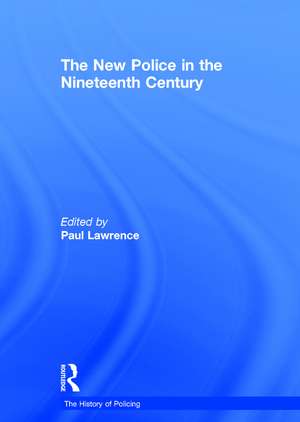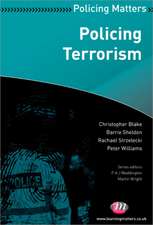The New Police in the Nineteenth Century: The History of Policing
Editat de Paul Lawrenceen Limba Engleză Hardback – 4 mar 2011
Preț: 1057.26 lei
Preț vechi: 1412.84 lei
-25% Nou
Puncte Express: 1586
Preț estimativ în valută:
202.31€ • 211.76$ • 168.38£
202.31€ • 211.76$ • 168.38£
Carte tipărită la comandă
Livrare economică 31 martie-14 aprilie
Preluare comenzi: 021 569.72.76
Specificații
ISBN-13: 9780754629450
ISBN-10: 0754629457
Pagini: 544
Dimensiuni: 169 x 244 x 41 mm
Greutate: 1.27 kg
Ediția:1
Editura: Taylor & Francis
Colecția Routledge
Seria The History of Policing
Locul publicării:Oxford, United Kingdom
ISBN-10: 0754629457
Pagini: 544
Dimensiuni: 169 x 244 x 41 mm
Greutate: 1.27 kg
Ediția:1
Editura: Taylor & Francis
Colecția Routledge
Seria The History of Policing
Locul publicării:Oxford, United Kingdom
Cuprins
Contents: Introduction; Part I: Police Reform and Administration: The Bedfordshire Police 1840-1856: a case study in the working of the Rural Constabulary Act, Clive Emsley; Reform of the Borough police, 1835-1856, Jenifer Hart; The County and Borough Police Act, 1856, Jenifer Hart; The new police, crime and people in England and Wales, 1829-1888, D.J.V. Jones; The Metropolitan Police Receiver in the XIXth century, R.M. Morris; The police system of London, W. O'Brien; The Home Office and the provincial police in England and Wales, 1856-1870, Henry Parris; Whigs and coppers: the Grey ministry's National Police Scheme (1832), David Philips and Robert D. Storch. Part II: Changing Patterns of Policing: Recruiting the English policeman, c.1840-1940, Clive Emsley and Mark Clapson; 'Private policing and the workplace': the Worsted Committee and the policing of labor in Northern England, 1840-1880, Barry Godfrey; Policing London's morals: the Metropolitan Police and popular culture, 1829-1850, Stephen Inwood; Early policing methods in Gloucestershire, Bryan Jerrard; The plague of the blue locusts: police reform and popular resistance in Northern England, 1840-57, Robert D. Storch; The policeman as domestic missionary: urban discipline and popular culture in Northern England, 1850-1880, Robert D. Storch; The new science of policing: crime and the Birmingham police force, 1839-1842, Michael Weaver. Part III: The New Police - Ireland (The Royal Irish Constabulary): Peel and police reform in Ireland, 1814-18, Tadhg Ó Ceallaigh; James Shaw-Kennedy and the reformation of the Irish Constabulary, 1836-38, Gregory J. Fulham; The domestication of the Royal Irish Constabulary, 1836-1922, W.J. Lowe and E.L. Malcolm; Policing famine Ireland, W.J. Lowe; The constabulary agitation of 1882, W.J. Lowe; 'The reign of terror in Carlow': the politics of policing Ireland in the late 1830s, Elizabeth Malcolm. Part IV: International Comparisons: A typology of 19th-cen
Notă biografică
Paul Lawrence is Senior Lecturer in European History at The Open University, UK
Descriere
Written by leading criminal justice historians, the articles brought together in this collection challenge accepted views regarding the introduction of the 'New Police' to Great Britain and Ireland during the period 1829 to 1856. The research shows that there were significant changes to the way in which Britain and Ireland were policed during the nineteenth century, but that these changes were by no means as straightforward or as progressive as they have been represented.














